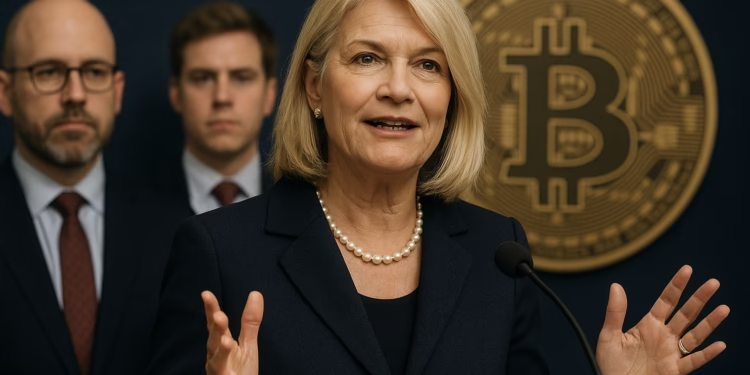U.S. Senator Cynthia Lummis has reignited debate around the creation of a Strategic Bitcoin Reserve, calling it “the only solution” capable of offsetting America’s ballooning national debt. Her renewed push comes amid escalating fiscal challenges, as the U.S. debt surpasses $37 trillion, a level economists warn could threaten future economic stability.
In a recent social media post, Lummis stated, “I truly believe the Strategic Bitcoin Reserve is the only solution to offset our national debt. I applaud President Donald Trump and his administration for embracing the SBR, and I look forward to getting it done.”
The post accompanied a Bloomberg Television interview clip in which Lummis discussed the federal government’s growing interest in holding Bitcoin as a reserve asset. She clarified that while there is no current plan to convert U.S. gold holdings into Bitcoin, the administration is “exploring other ways to have a Strategic Bitcoin Reserve.”
According to Lummis, Bitcoin represents an asset that appreciates over time and could serve as a safeguard against inflation and mounting fiscal deficits.
“Bitcoin is the only asset that grows stronger over time as it’s a digital hedge that can help protect future generations from debt,” she said during the interview.
Legislative roadmap for the Strategic Bitcoin Reserve
Earlier in 2025, Lummis and Alaska Congressman Nick Begich introduced the BITCOIN Act of 2025, a comprehensive framework designed to establish a federal Strategic Bitcoin Reserve. The proposed legislation outlines a phased plan under which the U.S. Treasury would purchase 200,000 BTC annually for five years, holding the assets for at least two decades as a fiscal stabilizer.
Under this strategy, the reserve would accumulate roughly one million Bitcoin about 5% of the cryptocurrency’s total eventual supply which is an amount Lummis claims could “cut our debt in half within 20 years.”
The proposal has divided policymakers. Supporters argue that a Strategic Bitcoin Reserve would diversify U.S. holdings and enhance financial resilience, while critics warn of volatility and regulatory complications.
“Diversifying into digital assets like Bitcoin could give the U.S. an edge in global finance,” said Dr. Paul Krueger, a monetary policy analyst at the Brookings Institution. “But it also introduces new layers of risk tied to price fluctuations and cybersecurity.”
Global momentum behind sovereign Bitcoin reserves
Momentum behind national Bitcoin reserves is building globally. Reports suggest that the U.S. government already controls about $14 billion in Bitcoin, largely recovered from international cybercrime operations involving Chinese-Cambodian online scams.
Other nations including the Philippines, Brazil, and Sweden are reportedly studying similar strategies to incorporate Bitcoin into sovereign reserves. Lummis has praised these developments, arguing that the U.S. must not fall behind in the digital asset race.
“The Strategic Bitcoin Reserve is not just about fiscal stability,” she said. “It’s about national competitiveness and ensuring that America leads in the digital financial era.”
While the Bitcoin network continues to attract institutional interest, price volatility remains a challenge. Data from crypto.news shows BTC trading around $101,535 down 10% this week after briefly dipping below $100,000. Despite short-term market fluctuations, long-term advocates see strategic accumulation as a safeguard against inflation and debt risk.
Political and economic implications for the U.S.
The Strategic Bitcoin Reserve debate highlights a growing divide in Washington over how digital assets fit into national economic policy. Proponents like Lummis view Bitcoin as “digital gold” capable of strengthening the dollar’s position in global markets. Skeptics, however, caution that tying public reserves to a volatile, decentralized asset could destabilize fiscal management.
Still, Lummis’ advocacy underscores a broader political shift toward mainstream acceptance of Bitcoin. Her proposals build upon earlier bipartisan efforts to create comprehensive digital asset regulations and to clarify the federal role in blockchain innovation.
“Bitcoin can be more than a speculative investment as it can be a strategic asset that reinforces America’s financial sovereignty,” Lummis said. “The Strategic Bitcoin Reserve is our opportunity to secure that future.”
As the Senate prepares to revisit the BITCOIN Act, analysts expect heated debate over the practicality of integrating digital assets into government balance sheets. For now, Lummis’ vision continues to fuel national conversation not just about Bitcoin’s potential, but about how the U.S. might redefine the very concept of a financial reserve in the digital age.










